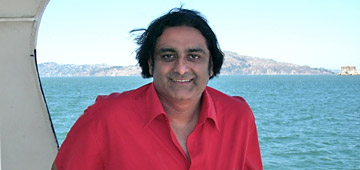We regret the passing, on April 11, 2024, of the distinguished Romanian author and critic Dan Cristea, who served as the editor in chief of the Luceafărul de Dimineață cultural monthly. In addition to being an alum of the 1985 Fall Residency, Cristea received his PhD in Comparative Literature at the University of Iowa.

Farhad A.K. Sulliman KHOYRATTY (fiction writer, editor, translator; Mauritius) teaches at the University of Mauritius. His short story, “The Emperor’s New Clothes,” was published in Jungfrau: A Selection of Works From the Caine Prize for African Writing (2007). Other pieces have appeared in Mauritian Impressions 2010, Journeys, Farafina Literary Journal, Mauritian Voices – New Writing in English, and in the PEN anthology African Compass, and elsewhere. He has also edited numerous collections and anthologies, including Mauritian Writers’ Association Commemorative Literary Magazine 2002 and Stopovers in a Poet’s Mind (2010)..
Literary/personal:
Q: How, and where, is your work going right now?
FK: It sounds like the sort of question a potential father-in-law might ask… [grins] An anthology of Mauritian writing in English, a first in two decades, that I edited has just appeared in Mauritius. Reviews of the book have been good so far. I am also busy working on an anthology of my own short-stories. It isn't always easy to juggle creative writing and academic research.
Q: What book(s) are on your nightstand? What films or TV programs have you liked lately?
FK: I always keep a pile of books and read any of them according to whim before I hit the sack. Right now, on my nightstand you will find The Ghost (Robert Harris), the novel that inspired the recent film, The GhostWriter (Polankski, 2010); the old classic Cat on a Hot Tin Roof (Tennessee William) which I am re-reading out of nostalgia for Liz Taylor after her death (she played one of her best roles in the Richard Brookes film version); Le Rocher de Tanios (Amin Maalouf is on the current Man Booker shortlist reminded me to read the older book) and finally the hilarious The Golden Gate (Vikram Seth) that a friend offered me since I was saying that I missed San Francisco and the US generally.
I teach popular cinema and I get to watch a huge array of popular films (mostly American, Indian, French and Latin American) but personally tend to like both popular and more 'arty' or Avant-Garde films. I recommend those films that I saw recently:
- Biutiful (Iñárritu, 2010), one of the most powerful recent films I've seen – it is about Barcelona, one of my favourite cities;
- District 9 (Neil Blomkamp, 2009), a very clever South African film on all counts, except in its stereotypical representation of Nigerians and perhaps Afrikaners;
- Lebanon (2009) by Israeli director Samuel Maoz I found a very haunting film;
- The delightful film Ayneh (Jafar Panahi, 1997) I watched again with a poignant pleasure last week – Panahi has been in jail in Iran since March last year for a film he is making.
Q: Is there a book or an author you re-read for intellectual company?
FK: There are many —
- Jalal-ud-Din Rumi's Masnavi: I can never get enough of the delicacy of its poetry — if life can produce such beauty it must be worth it;
- Any Shakespeare, although the sonnets and the tragedies are my favourites;
- Malcolm X's Autobiography is a continued inspiration;
- The Bhagavad Gita and its practical philosophy;
- Being and Time by Heidegger, a major influence on my work and life;
- Asterix the comic book has lit my life with Gallic irreverence and levity about the world from childhood to manhood.
Literary/generic:
Q: What writers, or work, do you think should be getting more attention and translation? What literary neighborhood do you keep an eye on?
FK: African writing in general ought to get more attention from the world. It isn't surprising to me that Mutiny by Mauritian writer Lindsey Collen (twice the winner of the African Commonwealth Prize) was declared by The Guardian as one of the world's "best unread books."
Similarly keep an eye on the promise by Zambian/Zimbabwean writer Pettina Gappah (living in Switzerland), whose excellent first anthology of short-stories, Elegy for Easterly was published recently and won the Guardian First Book Award 2009. It is ten times deserved.
It is also shocking that the excellent African writer, Jamal Mahjoub (originally from the Sudan, but currently living in Spain), isn't given more attention.
From the past, many Francophone African writers deserve more attention, and are rarely translated – Ahmadou Kourouma's appropriation of language, Sony Labou-Tansy's African Magic Realism. A loss to the Anglophone world...
Q: How do you feel about creative writing as a university-level/academic discipline?
FK: I believe that as long as the inner creativity of students is nurtured and encouraged, as long as students are exposed to as many strategies of creative writing as possible, as long as students aren't told exactly how to write and what to write, a creative writing degree at university can provide an excellent footing for writers. In fact, writers tend to thrive best in contexts within which their writings can be assessed by peers, discussed informally, where ideas can be exchanged and sounded off others.
General/politics
Q: What role should the state have with respect to culture and the arts?
FK: Culture and the arts ought to be supported and promoted by the state in the most open-minded way possible.
Q: In which (geopolitical) direction do you expect to be looking 10 years from now for major cultural changes?
FK: In many ways, the much-maligned Middle-East seems to be pointing the way to an increase in awareness of responsible democracy throughout the world.
Find Us Online